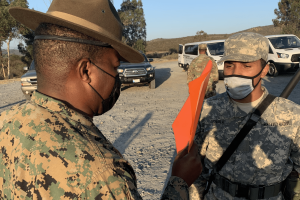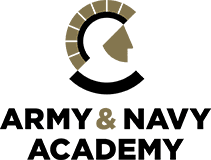
For young people who attend boarding schools, learning is a 24/7 experience, given the fact that so much of what can be learned takes place well after the normal school day. A national study a few years ago showed that the average “day student” – one who lives at home while attending school – spends a little more than six and a half hours a day in class, leaving the remaining daylight hours for a variety of supervised or unsupervised activities that, in many cases doesn’t provide learning opportunities.
Boarding schools, such as the Army and Navy Academy, a college preparatory boarding school for middle- and high-school boys in Carlsbad, Calif. can be described as schools where learning never stops. Lessons taught at these schools extend well beyond the walls of the classroom and the clock on the wall to include skills that surpass conventional academic subjects.
The fact that the 110-year-old Academy has a military emphasis further reinforces the advantages all boarding schools have. The school’s military environment shapes young men (aka Cadets) into leaders while instilling good character and self-confidence through three behavioral characteristics:
- The military chain of command teaches Cadets how to follow and then lead;
- Uniforms Cadets are required to wear instill pride in the school while creating an atmosphere of uniformity;
- A military structure provides an expected consistency that helps boys develop essential life skills such as accountability, self-discipline, and self-motivation that result in the combination of emotional, individual, and moral qualities that define good character.
Who provides learning opportunities beyond the classroom
The personal and other character factors mentioned here have been covered in previous blogs. What hasn’t been covered in any detail is who are responsible for providing the Academy’s Cadets with a learning environment that goes well beyond the normal school day to educate, develop, and mentor young men of good character” – to borrow part of the Academy’s mission statement.
Introducing the Army and Navy Academy’s Trainer, Advisor, Coach team, better known as TAC Officers. These are adult male company leadership advisors whose obligation it is to train, advise, and coach every Cadet to do the very best he can to meet the Academy’s objectives in leadership, character development, and service. Each individual Cadet is assigned a TAC Officer.
TAC Officers oversee their Cadets after and beyond normal class hours in their physical development activities, mandatory study periods, and mentoring . In a sense, they function as the Cadet’s parents while he is at school, enforcing personal appearance standards, room cleanliness, and good behavior while in the campus barracks – and developing leadership characteristics that Cadets learn in the Academy’s JROTC program. Many Academy alumni describe their TAC Officer as their father figure while away at school.
How TAC Officers are selected and trained
Some TAC Officers begin as members of the Academy’s security team. The school’s senior leadership has the opportunity to get to know them, observe their personality and comportment, and see how they interact with Cadets and others on campus. The result is those who do fit well, pass rigid professional and personal screening criteria, and want to become TAC Officers must have demonstrated positive interpersonal customer service skills. Many have had experience working with teenage boys as coaches and in other leader roles.
Like all new and returning Academy employees, TAC Officers undergo an annual orientation, security training, and are trained and mentored on an ongoing basis by other TAC Officers. Along with teachers and administrators, they also undergo the Gurian Institute’s training program that certifies teachers, administrators, and staff members on how best to teach boys, recognizing that boys learn differently than girls.
Interacting with parents and teachers
No one on campus spends more time with and knows Cadets better than their TAC Officer. For that reason, the Cadet’s TAC officer is the first point of contact for all parents who may have questions about their Cadet’s living situation, academic progress, discipline record, emergencies or other Cadet Life issues. The relationship between the TAC Officer and his Cadets’ parents forms an essential partnership that enables their Cadet to succeed.
TAC Officers meet regularly with their Cadets’ teachers, counselors as well as administrators, based the individual needs of each Cadet assigned to him.
How the COVID pandemic has affected TAC Officers’ role
TAC Officers are spending even more time with their Cadets due to the pandemic for both remote and in-person learning situations where more communications with Cadets and their parents are necessary. Since varsity sports competitions with schools has been embargoed during the pandemic, TAC Officers have increased physical training activities with Cadet sports team members as well as other Cadets.
The Army and Navy Academy believes greatness lies in every boy. But first they need to believe in themselves. Every day, we listen, challenge, and encourage boys to imagine and accomplish their goals. We know that when we believe in a boy and nurture his best aspirations, he’ll discover his best self.
“We work to instill in every boy who comes here the belief he can achieve or exceed any goal he sets for himself,” says retired Army Major General Arthur Bartell, the Academy’s President Emeritus. “But first he has to learn to believe in himself through learning self-confidence, self-discipline, resilience, independence, goal-setting, time management as well as personal character values. Along with our teachers and counselors, our TAC Officers play a key role in equipping each Cadet with those characteristics he will need to succeed as an adult.”
